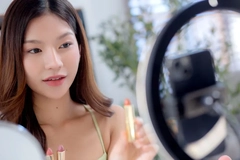Anticipatory beauty: Preventive, personalized and tech-driven skin care proliferates

Beauty brands are going beyond treating visible skin concerns and moving toward technologies and formulations that predict, prevent, and personalize. By addressing consumer needs before they fully surface, the personal care industry is shifting from reactive to anticipatory care.
AI-powered diagnostics and microbiome-balancing actives make modern skin care more intelligent and preventive. Ingestible supplements and genetic-level innovations are also moving beauty routines deeper into proactive health.
Personal Care Insights speaks to a spokesperson from Beiersdorf, Haut.AI CEO Anastasia Georgievskaya, and AB-Biotics co-founder Miquel Bonachera, about how personalization, technology, and opinions around wellness are reshaping personal care.
“Today’s consumers are more informed and skeptical than ever before. They’re not just passive shoppers — they are proactive researchers,” says Georgievskaya.

Holistic skinification
As consumers continue to take a more holistic view of beauty, the boundaries between skin care, lifestyle, and emotional well-being are increasingly blurred. The result is a wave of product development that moves beyond the face, tackling needs across the entire body — inside and out.
Beiersdorf describes this expansion as a natural response to consumer awareness: “Consumers are currently more aware of their whole skin needs, expanding the highly developed face care industry beyond the face area.”
The brand applies face-grade ingredients, such as hyaluronic acid and Thiamidol, to body lotions and lip care.
Beiersdorf states consumers “are ready to take actions today to avoid future pain points. Preventive measures are certainly a key skin and personal care feature that gains traction.”
 The rise of whole-body skinification reflects a broader shift toward preventive routines.The company’s over 15-year epigenetic research has led to new formulations aimed at preserving skin youthfulness rather than reversing visible damage. The company recently launched an epigenetic serum under the Eucerin brand, targeting youth gene reactivation.
The rise of whole-body skinification reflects a broader shift toward preventive routines.The company’s over 15-year epigenetic research has led to new formulations aimed at preserving skin youthfulness rather than reversing visible damage. The company recently launched an epigenetic serum under the Eucerin brand, targeting youth gene reactivation.
AB-Biotics’s Bonachera adds that the preventive skin care movement also includes ingestibles and lifestyle-linked beauty. “We are seeing a surge in ‘beauty from within’ solutions — nutritional supplements targeting skin, hair, and nails, backed by science,” he says.
Hyper-personalization
As skin care consumers grow more tech-literate, health-conscious, and results-driven, the demand for hyper-personalized solutions is growing in the personal care industry.
“The trend toward personalization in beauty and skin care is gaining momentum,” says the Beiersdorf spokesperson. “Consumers are increasingly interested in products tailored to their specific skin types and concerns. This includes a demand for hyper-personalized solutions that leverage technology, such as AI-driven assessments of skin conditions and environmental factors.”
Beiersdorf’s approach blends scientific research with advanced diagnostics, allowing the company to design products that cater to specific skin zones, such as sensitive underarms and delicate eye areas.
“Our skin scientists are equipped with best-in-class technology that, combined with our deep sense for consumer understanding, brings to market the best for different skin types, skin conditions, and skin phototypes,” Beiersdorf shares.
The Haut.AI CEO, Georgievskaya, emphasizes that personalization is no longer considered a luxury but a default consumer expectation. “The technology is already here, and consumers are fully aware of its potential. It would be unreasonable for them not to expect skin care experiences and products tailored specifically to them,” she says.
Smartphones now function as pocket-sized diagnostic tools, allowing consumers to bypass traditional trial-and-error and identify what best suits their skin.
This shift in mindset is reshaping the product discovery journey, with Haut.AI’s platforms enabling personalized recommendations. The tools use digital skin assessments and AI-driven simulations, allowing consumers to get used to app-based guidance that feels more like a conversation than a transaction.
Postbiotics for the microbiome
At AB-Biotics, personalization is linked to microbiome science. Bonachera explains that personalized care increasingly involves biologically driven solutions. “Consumers are seeking products and routines tailored to their unique skin types, concerns, and lifestyles,” he says..jpg) Scientific advancements in microbiome research, epigenetics, and postbiotics are driving innovation.
Scientific advancements in microbiome research, epigenetics, and postbiotics are driving innovation.
To meet this need, AB-Biotics formulates with postbiotics to support the skin’s natural microbiota. “We believe that clinically proven postbiotics are still flying under the radar, despite their immense potential,” says Bonachera. As an example, he points to AB-Sakei 65, a recently developed postbiotic derived from Lactobacillus sakei.
The ingredient has shown promising results in managing atopic dermatitis symptoms, including redness, itchiness, and barrier disruption.
Postbiotics are more stable than probiotics, making them suitable for cosmetic formulation. “They continue to support the skin microbiome, even though they are not alive,” Bonachera explains.
However, he warns that strain specificity and clinical validation are essential. “Not all postbiotics deliver the same effects, so research remains critical.”
“The future of personal care lies in the intersection of microbiome science, personalization, and systemic wellness,” Bonachera adds. “Companies that prioritize rigorous research and innovation, while staying attuned to consumer needs, will be best positioned to shape the next chapter of the industry.”
AI beyond the buzzword
AI has moved beyond surface-level trend status and has shown that it will remain in the industry to aid product development and consumer interaction.
“AI powers hyper-personalized digital experiences that allow users to receive tailored skin care recommendations using nothing more than a smartphone,” says Georgievskaya. At Haut.AI, the technology enhances consumer experiences while also acting as an informant for brands.
.jpg) Beauty brands are combining topical formulas, ingestible supplements, and holistic wellness to support skin from within.The company’s recently launched DeepCARE platform monitors patterns in user recommendations, allowing brands to identify underserved skin concerns and adjust their product development strategies accordingly. For example, if users consistently mention under-eye concerns, brands are more aware to develop in this space.
Beauty brands are combining topical formulas, ingestible supplements, and holistic wellness to support skin from within.The company’s recently launched DeepCARE platform monitors patterns in user recommendations, allowing brands to identify underserved skin concerns and adjust their product development strategies accordingly. For example, if users consistently mention under-eye concerns, brands are more aware to develop in this space.
“It enables brands to gather vast volumes of data from diverse touchpoints and convert it into actionable insights,” she explains. This has opened the door to faster innovation and more targeted formulations.
Beiersdorf has also embraced increased technological incorporation. “We use technology end-to-end in our innovation process,” the company shares, noting that AI enhances its processes, from lab research to consumer-facing tools.
“This creates a learning and adaptation approach, ensuring only the very best and most relevant innovations make it to market.”
AI is also changing how products are marketed and tested. Haut.AI’s SkinGPT, for example, simulates how an individual’s skin might evolve over time with different products. These “hyper-realistic” projections serve as a digital try-on for skin care, bridging the gap between what a product promises and what it delivers.
“Consumers can now see projections of how their skin might respond,” Georgievskaya says. “It turns skin care into a predictive, immersive experience.”
Aligning values for trust
Equipped with ingredient analysis apps and social media-fueled knowledge, consumers have taught themselves to scrutinize formulations, demand evidence, and reject brands that fail to meet ethical standards.
“Transparency is no longer optional,” says Georgievskaya. “Brands that earn consumer trust today are those that provide clear, accessible, and trustworthy information upfront. There is simply nowhere to hide.”
Bonachera echoes this, noting that clean labels and clinically supported claims are now non-negotiable. “Products with potentially toxic or unrecognizable ingredients are being rejected in favor of formulations that support long-term health,” he says.













